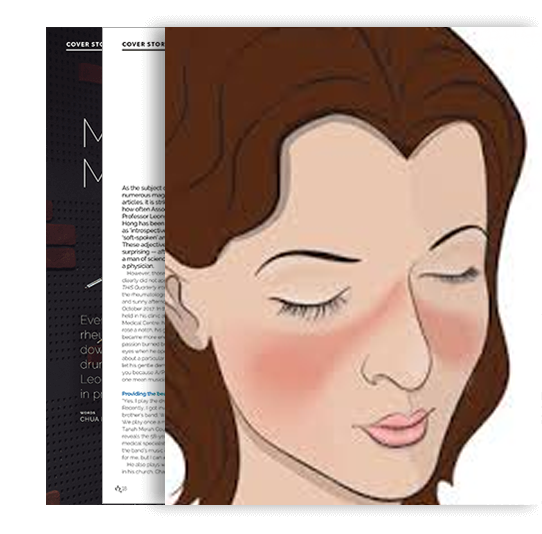A Great Imitator
One of the challenges with lupus is that it can be difficult to diagnose because its signs and symptoms often mimic those of other ailments. Even the most distinctive sign of the disease — a reddish pattern that resembles a butterfly with open wings across the two cheeks — is not always apparent. No two cases of lupus are exactly the same, and patients often present different symptoms, some of which may include:
- The "butterfly" rash (patches of dry, red skin on the cheeks)
- Chest pain
- Dry eyes
- Fatigue and fever
- Hair loss
- Headaches, confusion and memory loss
- Joint pain, stiffness and swelling
- Lung inflammation
- Raynaud’s Phenomenon, a condition where fingers and toes turn white or blue when exposed to cold or stress
- Seizures
- Shortness of breath
- Skin lesions that appear or worsen with sun exposure
One classic characteristic of lupus is that these signs and symptoms occur episodically; they continually flare up, then go into remission.
Risk Factors and Complications
Lupus is believed to be a genetic problem, although it does not typically run in families. Research indicates that it occurs due to mutations in multiple genes. It occurs more often in women and is usually diagnosed in people when they are between 15 and 40 years of age. It is also more common among African-Americans, Hispanics and Asians.
Lupus can also occur when someone with a predisposition for the disease comes into contact with a trigger. Potential triggers include sunlight, infections and certain medications, such as anti-seizure medications, blood pressure medications and antibiotics. Drug-induced lupus is temporary and stops when the medication is discontinued. Lupus, if not well controlled, can cause a number of problems:
- Kidney damage that leads to kidney failure
- Brain and central nervous system damage that causes headaches, dizziness, behavioural changes, hallucinations and even strokes or seizures
- Anaemia and increased risk of bleeding or blood clotting
- Inflammation of the chest cavity lining (pleurisy)
- Inflammation of heart muscles, arteries or heart membrane (pericarditis)
- Increased risk of miscarriage

